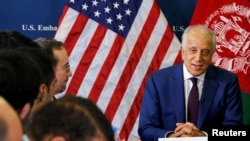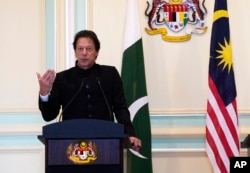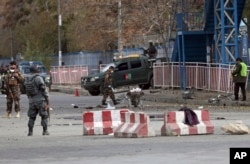A Pakistan-arranged meeting between U.S. and Taliban officials will be held Monday in the United Arab Emirates to push a political settlement to the war in Afghanistan.
The special representative for Afghan reconciliation, Zalmay Khalilzad, will lead the U.S. team at the talks in Abu Dhabi, the capital of the gulf state, a senior Pakistani official privy to the development confirmed to VOA on Sunday.
The official, requesting anonymity, said Islamabad has facilitated the dialogue after President Donald Trump wrote to Prime Minister Imran Khan earlier this month seeking his cooperation in bringing the Taliban to the table for peace negotiations.
Taliban spokesman Zabihullah Mujahid, in a brief statement sent to VOA, has confirmed participation of its political negotiators in Monday's meeting with American officials, but said that representatives of the host country, Pakistan, and Saudi Arabia will also be in attendance.
Initially, it was Khan who disclosed on Friday that Pakistan-aided talks between U.S. and Taliban officials would take place on December 17, though he would not say where.
The Pakistani prime minister, while speaking in the northwestern city of Peshawar, explained his country has agreed to assist in Afghan peace efforts because Washington has changed its position by requesting help, instead of saying Islamabad is not doing enough, as U.S. leaders have previously insisted.
A spokesperson for the U.S. embassy in Kabul, Afghanistan, on Saturday hailed Khan's remarks and support for a political reconciliation in the war-ravaged neighboring country.
"The United States welcomes any actions by the Pakistani government to promote greater cooperation, including fostering negotiations between the Taliban, the Afghan government, and other Afghans," the spokesperson told VOA.
"Special Representative Khalilzad has met, and will continue to meet, with all interested parties, including the Taliban, to support a negotiated settlement to the conflict in Afghanistan," noted the U.S. embassy official.
In his speech on Friday, Khan said that if peace were achieved in Afghanistan, his country will be the immediate beneficiary in terms of security, economic stability and regional connectivity.
Khalilzad, is visiting regional countries to gather support for Afghan peace talks. He is 14 days into an 18-day visit to the region and has already visited Pakistan, Afghanistan, Russia, Turkmenistan, Uzbekistan and Belgium.
Since taking office in September, the Afghan-born U.S. special envoy has held two meetings with the Taliban in Qatar, where the insurgent group operates its so-called "political office."
But those talks have been for the sake of talks, say insurgent and Pakistani officials.
Demands, accusations
Pakistani officials privy to Khalilzad's interaction with the Taliban have told VOA that until now no progress has been achieved because the insurgents adamantly demand "a date or timeframe" for all U.S. and NATO troops to withdraw from Afghanistan before the Taliban decides to participate in an intra-Afghan peace process.
Washington has long maintained Taliban leaders are sheltering in Pakistan with covert support from the country's intelligence agency. Washington has been urging Islamabad to use its influence to bring the insurgents to the negotiating table.
Pakistani officials say their influence over the Taliban has significantly declined over the years because the insurgents have gained control over large areas of Afghanistan and continue to pose serious battlefield challenges for U.S.-backed Afghan security forces.
The United States and its allies invaded Afghanistan 17 years ago and the war with the Taliban has since killed nearly 150,000 people, including Afghan civilians, security forces, insurgents and more than 2,400 American soldiers, according to an American University study released recently.
The longest war effort in U.S. history has also cost Washington nearly one trillion dollars. The Taliban has expanded its insurgent activities and currently controls or hotly contests about half of Afghanistan. The conflict is said to have killed more Afghan civilians and security forces in 2018 than in any other year.






